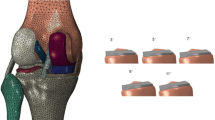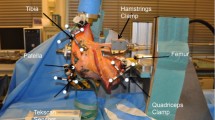Abstract
Introduction
Valgus high tibial osteotomy is an established treatment for unicompartmental varus osteoarthritis. However, only little is known about the effect of osteotomy in the sagittal plane on biomechanical parameters such as cartilage pressure and joint kinematics. This study investigated the effects of high tibial flexion osteotomy in a human cadaver model.
Materials and methods
Seven fresh human cadaveric knees underwent an opening wedge osteotomy of the proximal tibia in the sagittal plane. The osteotomy was opened anteriorly, and the tibial slope of the specimen was increased gradually. An isokinetic flexion-extension motion was simulated in a kinematic knee simulator. The contact pressure and topographic pressure distribution in the medial joint space was recorded using an electronic pressure-sensitive film. Simultaneously the motion of the tibial plateau was analyzed three-dimensionally by an ultrasonic tracking system. The traction force to the quadriceps tendon which was applied by the simulator for extension of the joint was continuously measured. The experiments were carried out with intact ligaments and then after successively cutting the posterior and anterior cruciate ligaments.
Results
The results demonstrate that tibial flexion osteotomy leads to a significant alteration in pressure distribution on the tibial plateau. The tibiofemoral contact area and contact pressure was shifted anteriorly, which led to decompression of the posterior half of the plateau. Moreover, the increase in the slope resulted in a significant anterior and superior translation of the tibial plateau with respect to the femoral condyles. Posterior subluxation of the tibial head after cutting the posterior cruciate ligament was completely neutralized by the osteotomy. The increase in slope resulted in a significant higher quadriceps strength which was necessary for full knee extension.
Conclusions
We conclude from these results that changes in tibial slope have a strong effect on cartilage pressure and kinematics of the knee. Therapeutically a flexion osteotomy may be used for decompression of the degenerated cartilage in the posterior part of the plateau, for example, after arthroscopic partial posterior meniscectomy. If a valgus osteotomy is combined with a flexion component of the proximal tibia, complex knee pathologies consisting of posteromedial cartilage damage and posterior and posterolateral instability can be addressed in one procedure, which facilitates a quicker rehabilitation of these patients.












Similar content being viewed by others
References
Brazier J, Migaud H, Gougeon F, Cotten A, Fontaine C, Duquennoy A (1996) Evaluation of methods for radiographic measurement of the tibial slope. A study of 83 healthy knees. Rev Chir Orthop Reparatrice Appar Mot 82:195–200
Chiu KY, Zhang SD, Zhang GH (2000) Posterior slope of tibial plateau in Chinese. J Arthroplasty 15:224–227
Coventry MB (1979) Upper tibial osteotomy for gonarthrosis. The evolution of the operation in the last 18 years and long term results. Orthop Clin North Am 10:191–210
Coventry MB, Ilstrup DM, Wallrichs SL (1993) Proximal tibial osteotomy. A critical long-term study of eighty-seven cases. J Bone Joint Surg Am 75:196–201
Fick R (1911) Spezielle Gelenk- und Muskelmechanik, Anatomie und Mechanik der Gelenke. Fischer, Jena, pp 535–538
Genin P, Weill G, Julliard R (1993) The tibial slope. Proposal for a measurement method. J Radiol 74:27–33
Giffin JR, Vogrin TM, Zantop T, Woo SL, Harner CD (2004) Effects of increasing tibial slope on the biomechanics of the knee. Am J Sports Med 32:376–382
Goutallier D, Hernigou P, Medevielle D, Debeyre J (1986) Outcome at more than 10 years of 93 tibial osteotomies for internal arthritis in genu varum (or the predominant influence of the frontal angular correction). Rev Chir Orthop Reparatrice Appar Mot 72:101–113
Hernigou P, Medevielle D, Debeyre J, Goutallier D (1987) Proximal tibial osteotomy for osteoarthritis with varus deformity. A ten to thirteen-year follow-up study. J Bone Joint Surg Am 69:332–354
Imhoff AB, Linke RD, Agneskirchner J (2004) High tibial osteotomy and cruciate ligament reconstruction for primary varus, double varus, and triple varus knee instability. Orthopade 33:201–207
Kapandji IA (2001) Physiologie articulaire. In: Kapandji IA (ed) Membre inferieur, vol 3. Hippokrates, Stuttgart
Lobenhoffer P (1999) Chronic instability after posterior cruciate ligament injury. Tactics, techniques, and results. Unfallchirurg 102:824–838
Lobenhoffer P, Agneskirchner JD (2003) Improvements in surgical technique of valgus high tibial osteotomy. Knee Surg Sports Traumatol Arthrosc 11:132–138
Lobenhoffer P, Agneskirchner J, Zoch W (2004) Open-wedge high tibial osteotomy with special medial plate fixator. Orthopade 33:153–160
Lootvoet L, Massinon A, Rossillon R, Himmer O, Lambert K, Ghosez JP (1993) Upper tibial osteotomy for gonarthrosis in genu varum. Apropos of a series of 193 cases reviewed 6 to 10 years later. Rev Chir Orthop Reparatrice Appar Mot 79:375–384
Matsuda S, Miura H, Nagamine R, Urabe K, Ikenoue T, Okazaki K, Iwamoto Y (1999) Posterior tibial slope in the normal and varus knee. Am J Knee Surg 12:165–168
McKellop HA, Sigholm G, Redfern FC, Doyle B, Sarmiento A, Luck JV Sr (1991) The effect of simulated fracture-angulations of the tibia on cartilage pressures in the knee joint. J Bone Joint Surg Am 73:1382–1391
Meister K, Talley MC, Horodyski MB, Indelicato PA, Hartzel JS, Batts J (1998) Caudal slope of the tibia and its relationship to noncontact injuries to the ACL. Am J Knee Surg 11:217–219
Odenbring S, Egund N, Knutson K, Lindstrand A, Larsen ST (1990) Revision after osteotomy for gonarthrosis. A 10–19-year follow-up of 314 cases. Acta Orthop Scand 61:128–130
Slocum B, Devine T (1984) Cranial tibial wedge osteotomy: a technique for eliminating cranial tibial thrust in cranial cruciate ligament repair. J Am Vet Med Assoc 184:564–569
Slocum B Slocum TD (1993) Tibial plateau leveling osteotomy for repair of cranial cruciate ligament rupture in the canine. Vet Clin North Am Small Anim Pract 23:777–795
Stukenborg-Colsman C, Ostermeier S, Hurschler C, Wirth CJ (2002) Tibiofemoral contact stress after total knee arthroplasty: comparison of fixed and mobile-bearing inlay designs. Acta Orthop Scand 73:638–646
Acknowledgements
We thank the German-Speaking Arthroscopy Society (AGA) for the financial support of this study
Author information
Authors and Affiliations
Corresponding author
Additional information
Winner of the AGA-DonJoy Award 2003
Rights and permissions
About this article
Cite this article
Agneskirchner, J.D., Hurschler, C., Stukenborg-Colsman, C. et al. Effect of high tibial flexion osteotomy on cartilage pressure and joint kinematics: a biomechanical study in human cadaveric knees. Arch Orthop Trauma Surg 124, 575–584 (2004). https://doi.org/10.1007/s00402-004-0728-8
Received:
Published:
Issue Date:
DOI: https://doi.org/10.1007/s00402-004-0728-8




